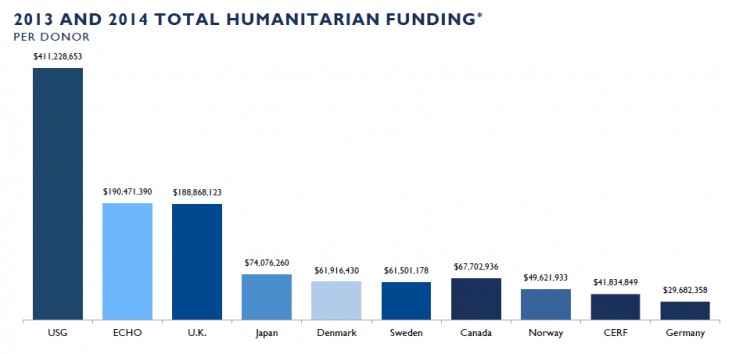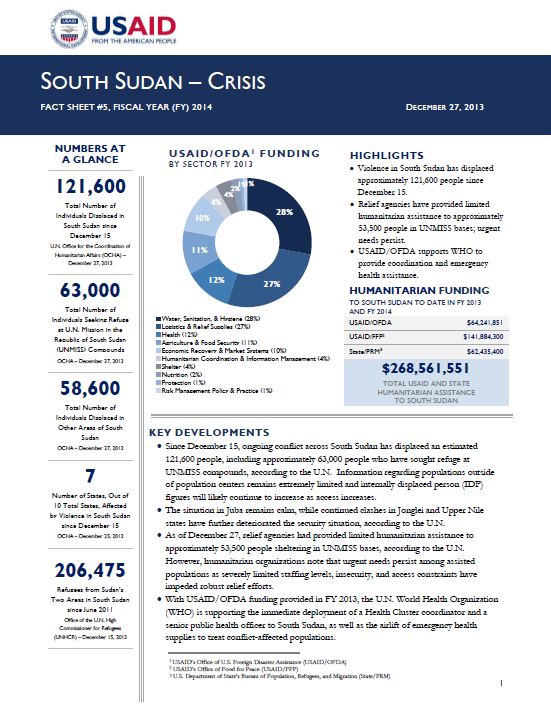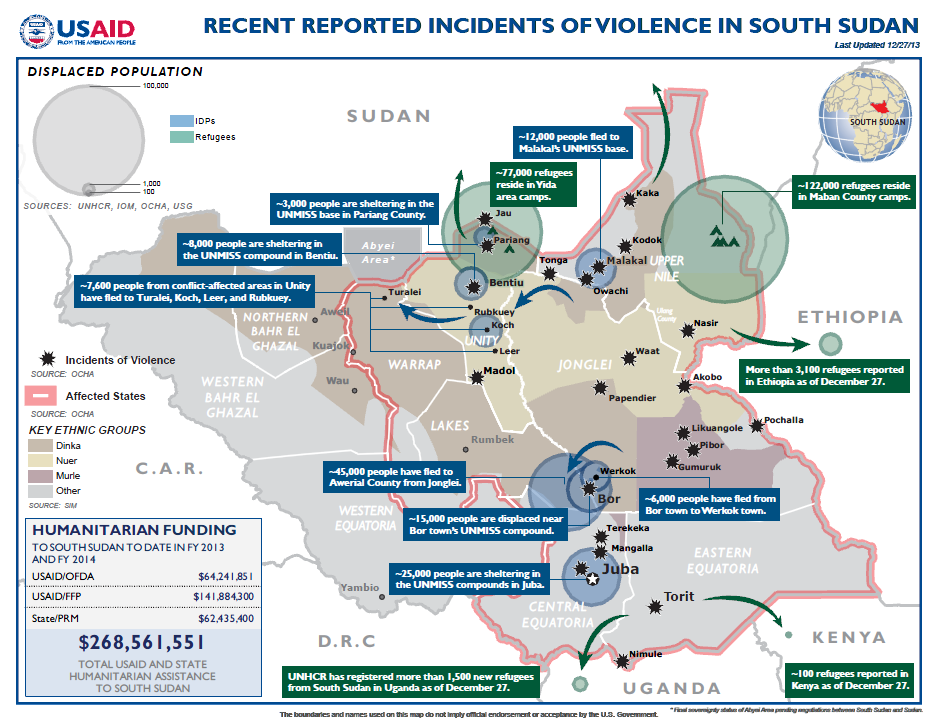- What We Do
- Agriculture and Food Security
- Democracy, Human Rights and Governance
- Economic Growth and Trade
- Education
- Environment and Global Climate Change
- Gender Equality and Women's Empowerment
- Global Health
- Humanitarian Assistance
- Transformation at USAID
- Water and Sanitation
- Working in Crises and Conflict
- U.S. Global Development Lab
Speeches Shim
April 25, 2014
Numbers At A Glance
916,900
67,900
849,000
295,900
236,700
Humanitarian Funding:
To South Sudan To Date In FY2013 and FY2014:
| USAID/OFDA | $120,608,953 |
| USAID/FFP | $180,884,300 |
| State/PRMDoD | $109,735,400 |
| TOTAL | $411,228,653 |
Highlights
Opposition elements kill 200 people and wound 400 others sheltering in a mosque in Bentiu town, Unity State
The U.S. Government (USG) and the U.N. Security Council condemn the targeted killings of civilians in Bentiu and Bor town, Jonglei State, during the week of April 14
KEY DEVELOPMENTS
The international community, including the USG and the U.N. Security Council, strongly condemned the recent violence in Bentiu and Bor towns, which resulted in civilian deaths and new population displacement. International actors condemned the targeted killing of civilians based on ethnicity, demanded an end to human rights violations, and called on the Government of the Republic of South Sudan (RSS) and former Vice President Riek Machar to speak out against the attacks and hold perpetrators accountable.
Barriers to humanitarian access, including insecurity, logistical challenges, and bureaucratic impediments, continue to hinder the delivery of relief commodities to populations in need. During a four-day trip to South Sudan in mid-April, USAID/OFDA Director Jeremy Konyndyk urged the RSS to follow through on promises to facilitate humanitarian access to populations in need, as levels of food insecurity in the country continue to increase.
Through its Rapid Response Fund, USAID/OFDA continues to respond to emergency needs in conflict-affected areas. For example, USAID/OFDA is supporting the International Organization for Migration (IOM) to conduct emergency health and water, sanitation, and hygiene (WASH) interventions, including the construction of elevated latrines and hygiene promotion activities, at the congested UNMISS base in Malakal.
INSECURITY, DISPLACEMENT, AND ACCESS CONSTRAINTS UPDATE
Ongoing conflict in South Sudan, particularly in Jonglei, Unity, and Upper Nile states, has displaced more than 1.2 million people—including 916,900 internally displaced persons (IDPs) and 295,900 people who are seeking refuge in neighboring countries, according to the U.N.
On April 15 and 16, opposition forces killed hundreds of South Sudanese and foreign country nationals following the capture of Bentiu town, according to the U.N. On April 15, opposition elements killed at least 200 civilians and wounded approximately 400 others at a mosque in Bentiu after separating individuals based on nationality and ethnic group. The violence in and around Bentiu triggered new displacement, forcing approximately 10,000 civilians to flee to the UNMISS base between April 16 and 23. Relief agencies are now rushing to provide assistance to a total of 23,000 people currently sheltering at the Bentiu UNMISS site.
On April 24, unidentified armed actors attacked an UNMISS barge convoy traveling north on the Nile River towards Malakal town. The convoy was transporting fuel and food commodities. The attack resulted in at least four injuries and will likely negatively impact humanitarian agency plans to transport commodities via river.
South Sudan Crisis Fact Sheet #39 April 25, 2014 ![]() (pdf - 351k)
(pdf - 351k)
South Sudan Crisis Map April 25, 2014 ![]() (pdf - 961k)
(pdf - 961k)
HUMANITARIAN NEEDS ASSESSMENTS AND RESPONSE ACTIVITIES
The U.N. World Food Program (WFP), in partnership with the U.N. Food and Agriculture Organization (FAO) and several non-governmental organizations (NGOs), continues to conduct emergency food security assessments in South Sudan. As of April 23, WFP and partners had completed emergency food security assessments at 28 out of 38 targeted locations, including areas of Jonglei, Unity, and Upper Nile, as well as UNMISS IDP sites across the country. Food security experts will use the data gathered from the assessments during the IPC analysis, which is scheduled to begin in Yei County, Central Equatoria State, on April 24.[1]
CAMP COORDINATION AND CAMP MANAGEMENT
The Camp Coordination and Camp Management (CCCM) Cluster—the coordinating body for humanitarian camp coordination and management activities, comprising U.N. agencies, NGOs, and other stakeholders—continues to facilitate the provision of humanitarian assistance to IDPs in UNMISS displacement sites across South Sudan. The Cluster continues to improve and expand existing IDP sites. IOM—a CCCM Cluster co-lead—is currently supporting site expansion and improvement activities in Bor; Malakal; Mingkaman town, Lakes State; and Juba, Central Equatoria State.
Since the beginning of the crisis, IOM has provided support to seven partners working to improve conditions for more than 100,000 IDPs in five of South Sudan’s 10 states. With IOM support, relief agencies are setting up camp management structures, such as IDP site committees that help identify urgent needs, and conducting CCCM trainings.
AGRICULTURE, FOOD SECURITY, AND NUTRITION
Despite ongoing challenges facing humanitarian response efforts in South Sudan, including insecurity, the looting of pre-positioned relief commodities, RSS-imposed access constraints, and costly illegal checkpoints, USAID/FFP partner WFP continues to distribute food assistance to populations in need. Since January, WFP has provided assistance to more than 700,000 beneficiaries, including 188,000 people in Jonglei and 159,000 people in Unity.
WFP recently completed a 15-day food commodity distribution, reaching approximately 22,000 people in and around Bentiu, including IDPs and wounded civilians at the IOM health clinic. Although tensions remain high in Bor following the April 17 attack on the UNMISS civilian protection area, WFP continues to provide assistance in the area. Since mid-March, WFP and partners have distributed approximately 120 metric tons (MT) of food commodities to more than 17,000 people in Bor County, including IDPs from Jonglei’s Twic East and Duk counties.
Meanwhile, insecurity continues to result in increased malnutrition levels throughout South Sudan. While organizations like the U.N. Children’s Fund (UNICEF) are scaling up response activities to meet increased needs, challenges—such as barriers to access and funding shortages—hinder response capacity.
During the week of April 14, UNICEF screened more than 16,000 children for malnutrition and admitted nearly 700 children to outpatient therapeutic feeding programs. Of the 17,340 children admitted to therapeutic feeding programs due to severe acute malnutrition (SAM) since January, approximately 65 percent are no longer experiencing SAM due to successful treatment, according to UNICEF.
In addition, UNICEF provided relief partners with more than 10,000 cartons of Plumpy’Nut—a specialized nutrition product—between April 15 and 21. The quantity is sufficient to meet the needs of more than 10,000 children experiencing SAM for a period of six to eight weeks.
To date in FY 2014, USAID/OFDA has provided UNICEF with $9 million in support for nutrition, protection, and WASH activities countrywide, including $2 million for nutrition activities.
As humanitarian agencies address critical nutrition needs in conflict-affected Jonglei, Unity, and Upper Nile, other relief actors note that high levels of malnutrition in non-conflict-affected areas also require donor attention.
HEALTH AND WASH
Through the Rapid Response Fund, an IOM-managed mechanism that enables national and international NGOs to quickly access funding to respond to acute crises, USAID/OFDA is supporting IOM to implement emergency health and WASH activities at the UNMISS base in Malakal. Due to overcrowding and the ongoing April-to-August rainy season, relief agencies are struggling to maintain adequate sanitation conditions and sufficient access to safe drinking water for IDPs sheltering at the UNMISS base.
Approximately 30 latrines have collapsed at the Malakal UNMISS base since the start of the rainy season. IOM-led sanitation teams are constructing new, elevated latrines to ensure sustainability. In addition, in coordination with other relief organizations, IOM is conducting hygiene promotion training for local staff to support increased awareness among the IDP community regarding the prevention of waterborne diseases. Meanwhile, the IOM-managed health clinic at the Malakal UNMISS base continues to provide primary and emergency health care services for IDPs.
Despite challenges, Médecins Sans Frontières (MSF) continues to provide health-related assistance to populations in need. To date, MSF has treated nearly 216,000 individuals in need of chronic and acute health care services in South Sudan. MSF operates primarily in UNMISS civilian protection areas, where health and sanitation conditions are rapidly deteriorating due to increasing numbers of IDPs, limited relief commodities, funding shortages, and the rainy season.
In Juba, MSF is providing medical assistance to IDPs in the Tong Ping UNMISS base and is constructing a 40-bed inpatient facility in the new civilian protection area adjacent to the U.N. House UNMISS base. MSF also runs a clinic for IDPs in the Malakal UNMISS base and a therapeutic feeding center in Bentiu, which currently benefits more than 250 children. In Awerial County, Lakes, 48,000 children have benefited from an MSF measles and polio vaccination campaign, and in Melut town, Upper Nile, MSF administered measles vaccinations to more than 7,000 children.
LOGISTICS AND RELIEF COMMODITIES
During the week of April 14, the Logistics Cluster facilitated the airlift of approximately 82 MT of food commodities and other relief items, including shelter materials and health supplies, on behalf of nine humanitarian organizations to support populations in Jonglei, Unity, and Upper Nile.
The Cluster also sent three mobile storage units to Rumbek town, Lakes, to facilitate the delivery of assistance to the IDPs sheltering in and around Mingkaman.
PROTECTION
On April 20, Special Representative of the U.N. Secretary-General (SRSG) for Children and Armed Conflict Leila Zerrougui issued a statement condemning the recent attack on the UNMISS compound in Bor, particularly highlighting grave violations committed against children during the incident. SRSG Zerrougui also expressed concern regarding reports of forced recruitment into armed groups, calling for the immediate cessation and investigation of widespread acts of violence committed against children.
On April 25, U.N. Secretary-General Ban Ki-Moon dispatched U.N. High Commissioner for Human Rights Navi Pillay and Special Adviser of the U.N. Secretary-General for the Prevention of Genocide Adama Dieng to South Sudan in response to the recent violence and reported human rights violations in Bentiu and Bor.
Relief actors continue to support conflict-affected children in Central Equatoria, Eastern Equatoria, Jonglei, and Lakes states. Despite access and security challenges, international NGO Save the Children is also providing psychosocial support to conflict-affected and internally displaced children in Lakes and Jonglei.
OTHER HUMANITARIAN ASSISTANCE
To date, international donors have provided approximately $491 million—nearly 39 percent of the $1.27 billion total requested funding—to support humanitarian activities through the South Sudan Crisis Response Plan. Of the $780 million shortfall in funding, humanitarian partners have identified that a minimum of $232 million is necessary to maintain current service levels and prevent a severe deterioration of humanitarian conditions in the next three months, according to the U.N.
On April 23, the Government of Japan (GoJ) contributed $4.6 million in support for conflict-affected and food-insecure populations in South Sudan, bringing total GoJ FY 13 and FY 14 contributions for South Sudan to more than $74 million. The recent funding will support WFP activities, including the provision of food commodities and humanitarian logistics support through the U.N. Humanitarian Air Service.

*Funding figures are as of April 25, 2014. All international figures are according to OCHA’s Financial Tracking Service (FTS) and based on international commitments during the 2013 and 2014 calendar years. USG figures are according to the USG and reflect the most recent USG commitments based on the 2013 fiscal year, which began on October 1, 2012, and ended September 30, 2013, as well as the 2014 fiscal year, which began on October 1, 2013.



Comment
Make a general inquiry or suggest an improvement.